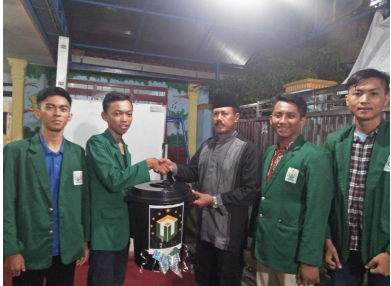Surabaya – Plastic waste has become a problem in every city in the world. eradicating against plastic waste continues to be carried out in Surabaya and surrounding areas.
You do this with a variety of ways, for example by not using plastic bags when shopping to use plastic waste for something useful.
To process the plastic waste, the public cannot do it alone.
They need help from other parties because processing plastic waste does require innovation and creativity. Especially help from academics.
The lecturer team was Edza Aria Wikurendra, Akas Yekti Pulih Asih and Wiwik Afridah. They were assisted by several students of Sulfi Titianto, Bintang Adi Kurniawan, Wahyu Kurniawan and Alaika Syarif.
The team conducted ecobrick training for residents in RW 01 Jagir Village, Wonokromo District, Surabaya City. This ecobrick training is a new way to utilize plastic waste into useful items.
it is done from year to year, waste production continues to increase. This is in line with the increasing number of Indonesian population so that the pattern of public consumption and people’s lifestyles also improve.
Public purchasing power of various types of staples and technology products as well as increasing business or activities to support the economic growth of a region can make a major contribution to the increasing volume of waste.
Edza said as the head of this community service team, in the City of Surabaya until the end of 2017 the total population recorded in Dispendukcapil was 3.065,000 people.
The large population and diversity of activities in metropolitan cities in Indonesia resulted in problems in urban infrastructure services, such as waste .
In one day the city of Surabaya produces 400 tons of plastic waste. The Surabaya City Green Sanitation and Open Space Office (DKRTH) recorded that the amount of waste entering the Benowo final disposal site in 2016 reached 1500 tons every day.
That number is smaller than 2015 which is 2000 tons every day (Amaluddin, 2017). although like that the pile of garbage still gives concern to the community because it can potentially have a negative impact and create other problems because the population in Surabaya continues to increase every year.
During this time there are many things done to overcome the problem of waste in Surabaya. The three paradigms of gathering – transport – disposal into processing are based on waste reduction and waste management.
However, this activity still faces a major obstacle, namely the low awareness of the community to sort waste. And also the uneven use of garbage bins in several residents’ houses on the grounds that there is no land to place trash bins because of the placement of people’s homes in small alleys.
No exception in RW 01 Jagir Village, Wonokromo District.
“we try to provide solutions by utilizing this plastic waste with ecobrick from there” Edza said when met in his office on the 5th floor of the Faculty of Health, Unusa Tower B Campus, Jemursari Surabaya, Monday (30/12).
Ecobrick is a plastic bottle that is filled with solid non-biological waste to make building blocks that can be reused. Ecobrick is able to provide new life for plastic waste.
Ecobrick is another way to utilize these wastes in addition to sending them to landfills.
Luckily with a good approach, the Unusa team was able to provide training in the village. Residents welcomed about this ecobrick. They even volunteered for this training.
“Thank God, the community welcomes this training,” said Edza.
There are various types of appropriate goods that can be used for various things such as chairs, tables and so on made by people with this ecobrick. “We are glad the results can be utilized by the community,” he said.
In this way Edza said, the hope could arise understanding, knowledge and awareness of each individual in dealing with plastic waste problems and can behave in a clean and healthy life.
The intervention in community service is carried out with two methods, namely the implementation of ecobrick manufacturing training to reduce plastic waste for humans and the environment so to create a clean and healthy life behavior.
With this training, it is expected that the understanding, knowledge and awareness of each individual can be increased. (lis / rud / public relations unusa)

 Bahasa Indonesia
Bahasa Indonesia

